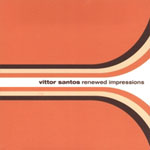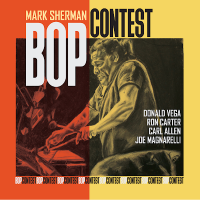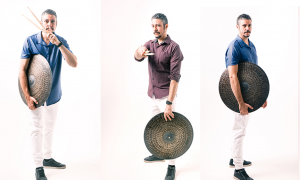Home » Jazz Articles » Interview » Butch Ballard: Legendary Philadelphia Drummer
Butch Ballard: Legendary Philadelphia Drummer
I was asleep, and my wife said, 'Daddy, you have a call from a Mister Duke Ellington.' I said, 'Who?'
 George Edward "Butch Ballard is a celebrated drummer, now 88, who swung with the Cootie Williams, Duke Ellington, and Count Basie big bands, to mention just a few of the items on his resume. Beyond that, however, this cat is truly an American phenomenon, an African-American from a working class family who realized his childhood dream through a total obsession with the drums during the time of segregation and through to the present day.
George Edward "Butch Ballard is a celebrated drummer, now 88, who swung with the Cootie Williams, Duke Ellington, and Count Basie big bands, to mention just a few of the items on his resume. Beyond that, however, this cat is truly an American phenomenon, an African-American from a working class family who realized his childhood dream through a total obsession with the drums during the time of segregation and through to the present day. Now, he looks back on a lifetime of achievements, warm friendships, and tales of top musicians. These reminiscences were occasioned by his receiving the Mellon Jazz Community Award on December 1st, 2006 for his musical achievements and contributions to jazz education in Philadelphia. On December, 10th, at the request of the Mellon people and the Kimmel Center for the Performing Arts, I interviewed Ballard at his long-time home in the Frankford section of Philadelphia, an ethnically diverse blue collar neighborhood where he has resided for most of his life. At 88, Ballard is totally alert and focused—like a drummer must be. He has remarkable energy for a man his age. He still fronts his own jazz trio which plays regularly around town. He has many, many students to whom he gives precious gems of insight. He dedicates himself to jazz education. His home is warm and full of life, his cousin Adeline whipping up dinner in the kitchen, Ballard moving all around the living room showing me his various mementos, recordings, and photographs. There is a warm feeling of spontaneous love and generosity there. This is a man who radiates joy and love. Mr. Ballard is an icon of African-American history whose legacy belongs in the Smithsonian Institute. Like Louis Armstrong, with whom he performed, Ballard represents those African-Americans who bore the indignities of segregation yet never lost their decency, love of all that is human, and spiritual roots. I feel blessed being in his presence. This iconic story of the courage and character of the African-American family has been represented in literature and drama like A Raisin in the Sun but has yet to be told in its fullness. But Ballard's identity is pure percussion! He even did the interview like a drummer: rhythmically, fast paced, and right on top of every question. I had to jump in there on the beat to give my questions. There was a pulsation and steady swinging movement throughout, which is difficult to capture in a transcription, but some of that does come through. So does Ballard's obvious affection for his mentors and fellow musicians and his gratitude for having lived a fruitful life. In part, you, the reader, will be taken back in time to the days of the big bands—the great African-American bands that played in Harlem and around the country and Europe—and will get a lively taste of what it was like to be a jazz musician coming up during those heady times.
Butch Ballard: Hi Vic! I just got back from church. The Second Baptist around the corner here.
All About Jazz: Do they have music there?
BB: They have two or three choirs. They do gospel music. No jazz.
AAJ: Trudy Pitts plays some church gigs. Do you know her?
BB: Who don't I know in Philadelphia?
AAJ: She's playing at Old Pine Church. It's the anniversary of their long-running Jazz Vespers, which she helped to start.
BB: I played there—three or four times. By the way, you should know that I'm hard of hearing. Recently I met one of the women from the Mellon Jazz Festival. She said, "Mr. Ballard, you can hardly hear anything!
AAJ: [Voice raised a few decibels.] What do you do when you play?
BB: I hear everything when I'm playing the drums.
AAJ: That's amazing that you can hear everything only when you're playing music!
BB: I also know the book—I've been with the band fourteen years, so I know the whole library. I also know the entire book of the Legends of Jazz band at the Clef Club. And I did the same thing with Ellington, Basie, and Clark Terry. I memorized the whole book so I could add some of my own reflections in there. I learned that from getting' cussed out by some of my own peers when I went to New York, like big Sidney Catlett, J.C. Heard, and Papa Joe Jones. Shadow Wilson was one of my first inspirations here in Philadelphia. I watched him play with the Bill Dogherty Big Band. Shadow was one of the greatest drummers in the world. He got hooked up with drugs, and it took him out. But what a great drummer! He'd put that foot down, boy! Wow!
AAJ: Did you guys do the rhythm on the bass drum or the cymbals?
BB: No, no. I use the whole drum set—cymbals, bass drum, sock cymbal in your left hand. You do what you have to do. These days, I teach drums—I tell my students things they must do. The drummer holds the whole band together. You can't be messin' around talkin' to some woman or something. You got to be playing the drums, playing the chart. You've got to be right there.
A Kid Obsessed with Drums
AAJ: You grew up here in Frankford?
BB: I grew up at 4610 Hawthorne Street. Two blocks away from here.
AAJ: How did you get interested in playing the drums, and how did you get turned on to jazz?
BB: Those are two full questions. When I was seven to ten years old, the American Legion post at Orthodox Street and Paul Street used to march often for parades and so forth, up and down Orthodox Street, Torresdale Avenue, over to Margaret Street and then back to the post. I would notice only the drummer. I'd follow close up to him, and he'd shove me away, saying, "Get away, son! I'd pick myself up and keep following him. I'd get scolded by my parents for getting home late. I kept doing that. I knew that's what I wanted to do. I'd take my mother's silverware and go out in the back yard, playin' on bricks and stones. My father would keep getting on my case, but that's what I did because I wanted to play the drums.
When I was about ten or eleven, my dad went downtown to a pawn shop and bought me a set of drums. I was so happy. It had a huge 32-inch bass drum, too big for me. Then he bought a snare drum and one cymbal, and that was my drum set until I was sixteen years old. I was so tickled to play those drums. They had block parties in the neighborhood, and I met a man named Willie Grimes, an old guy who played the drums. I kept pursuing him, until he let me sit in with his band. The regular drummer thought I did pretty good, and they got Professor Coles to give me drum lessons for 75 cents a lesson! And that's how I learned to play the drums.
AAJ: Were you into jazz at that time?
BB: No, I was just playing the drums.
AAJ: I understand you eventually got hooked up with the Basie Band.
BB: That was much later on.
Basie and the Big Bands
AAJ: During that stretch of time, how did you get from lessons with Professor Coles to Basie?
BB: Well, first I went down to the Boys Club and heard Herb Thornton's band. They actually let me sit in. So the regular drummer said, "How did you learn to play drums? I said "Professor Coles is teaching me. After that, a guy who heard me sit in played in a band downtown and invited me to join his band. He invited me to a rehearsal in South Philadelphia. Believe it or not, I got all my drums together and I walked to the Frankford elevated line, went to Fifteenth and Market, and took the subway to South Philadelphia, where the guys helped me carry my drums to the house where we were rehearsing. I was sixteen or seventeen years old. They liked me, and I stuck with the band for a few months. My parents thought I was out of my mind, carrying the drums over there every week. But I wanted to play the drums.
And I did! And I worked with a little group downtown called "The Dukes [no connection to Ellington] and I performed with them for three or four years. During that time, I hung around with Shadow Wilson, listening to him play in Bill Dogherty's big band. Then the guys in the Dukes said, "Hey man, you're real good. Why don't you go to New York? I said, "No, I'm still learning. Then I met Papa Joe Jones of the Basie Band. He was my idol. He could play, oh man. Anyhow, he got sick and Shadow Wilson went with Basie. They were in California, and then Shadow got an offer to be in the Woody Herman band, which paid a lot more money than Basie. So he recommended me to take his place. So Basie called me up, sent me a ticket, and flew me to California. That was around 1947-48. I was scared to death.
AAJ: Who was in the Basie Band at that time?
BB: Let's see. There was Earl "Smartie Warren on lead alto sax, Jack Washington on baritone, Jimmy Warren on one of the alto chairs. Emmett Berry, Clark Terry, Harry "Sweets Edison on trumpet. Singleton Palmer was on bass. I used to hear him at a section of St. Louis called Gaslight Square, when I went there to visit my sister. Clark Terry was in George Sachs' big band in St. Louis. That's where I met Clark. Before I went with Basie, I had worked with Cootie Williams, Eddy Vincent, and Arnett Cobb in New York. I even did a little stint with Illinois Jacquet's band.
AAJ: Let me see if I get the sequence right. At some point, you did a turn in the Navy in WWII?
BB: That's right. I was in the Sea Bees, and the commanding officer said, "I hear you've played with some of the big bands. He sent me over to audition. The guys in the band, said, "Boy, this fellow can play. So they put me in the band barracks. That was in Guam, 29th Special. I stayed in the band for three years. This was not a jazz band, but a military band.
AAJ: Just out of curiosity, was your unit all African-American, or was it integrated?
BB: It was all Afro-American. During that time there was no integration at all in the armed forces.
 AAJ: What did you do after the war?
AAJ: What did you do after the war? BB: They shipped me back to San Francisco, I got discharged, and caught a train to Philadelphia, and then back to New York to try to get my job back. But I had lost my "chops, and Cootie Williams' group didn't rehire me. So I went back home and started practicing, to get my chops back. I started working in Philly, got myself together, went back to New York and got a job with Eddie "Lockjaw Davis at Minton's Playhouse. I did several record dates with them. Then I got offers from Eddie Vinson and Arnett Cobb, so I jumped from band to band for a while. I worked in Clark Terry's big and little bands. So I was doing quite well.
AAJ: When does Duke Ellington come up?
BB: 1950. I was here in Philly then. I bought this home in 1950 for my wife, God rest her soul. All those pictures over there are hers. She was the most wonderful woman I ever met in my whole life. I married her when she was 21 and I was 22. Gorgeous, well-built lady, great cook, made all the draperies, she could sew like crazy. Her name was Jessie. We celebrated our fiftieth wedding anniversary in Chicago. She was from Mississippi and Gary, Indiana. I married her in 1941-42 while I was still in the service. class="f-right"> Return to Index...
Butch, This is Duke Ellington
So, in 1950, after I got my chops back, I got this call from Duke Ellington. I was asleep, and my wife said, "Daddy, you have a call from a Mister Duke Ellington. I said, "Who? I took the phone. He said, "Are you Butch Ballard? Butch, this is Duke Ellington. My son, Mercer, told me you play good drums. Well, I'd like you to come join our band in Europe for a few months. I want you to speak to my agent in New York. My heart is beating fast. I said to my wife, "It's Duke Ellington, sweetheart. He wants me to come with his band! We stayed up the whole night. I got my passport together, and went to New York and signed up with his agent. I had a meeting with Duke Ellington. We went over on the Ile de France. I met all the guys, Johnny Hodges, Harry Carney, Cat Anderson. I was scared to death! We had rehearsals on the boat. Sonny Greer had all his drums there.
AAJ: Why were you going if Sonny Greer was the drummer?
BB: Sonny was drinking quite a bit, and Duke wanted me there for insurance. I met Harry Carney, Russell Prokoff, Paul Gonzalves, Jimmy Hamilton.
AAJ: Was Billy Strayhorn on that trip?
BB: Yes.
AAJ: Did they have a vocalist?
BB: Kay Davis and Chubby Kemp, those were the two girls. Kay was gorgeous. She had just graduated from Northwestern University. I fell in love with her the first time I saw her. But she didn't pay me no mind. Chubby Kemp, she was a little fat lady. She said, "You don't even notice me! [laughter]
AAJ: What was the first job you did over there?
BB: We arrived in Le Havre, France. We had rehearsed on the boat every day.
AAJ: So Sonny was the main drummer. How did you get a chance to play?
BB: At the first concert in France. Wendell Marshall was my partner, the bassist, one of the finest musicians in the world. He showed me everything I needed to know in the Ellington band. I had a small set of drums, and Sonny had a huge drum set, but Duke liked the way I could swing.
AAJ: Did you do any recordings with Ellington?
BB: Oh yeah! I made a whole lot of records with the band at Capitol Records in California. Juan Tizol, Strayhorn, and Ellington wrote a lot of tunes for the band at the time.
AAJ: Did you eventually take over from Greer?
BB: We came home from Europe and Duke hired Louis Belson. Duke wanted the double bass drums, which I wasn't into. But Duke knew I could play his book. So I got back with the band in California. Cat Anderson, Clark Terry, Willie Cook, and Ray Nance were in the band at that time.
AAJ: Now how did you get to play with Ella Fitzgerald and Sarah Vaughan?
BB: That took place back when I was with Cootie Williams' band at the Savoy Ballroom in the early '40s. At that time, I worked with Ella and Sarah and Dinah Washington and Pearl Bailey. I even worked with Pearl when she performed at the small clubs in downtown Philadelphia. I knew her first husband, Les Miller, a very handsome guy. She was crazy about him and insanely jealous. Cootie Williams had a great band then. We also had Eddie "Cleanhead Vinson, Charlie Holmes, Stan "The Man Taylor, Lee Polk, and Gritty Walton. Those were the saxophonists. Joe Guy, Emmett Berry, and E.V. Perry on trumpet.
AAJ: You played with Lucky Millinder for a while?
BB: He was a band leader back then. He played mostly the Savoy Ballroom, and other places as well. He was wild! He would jump on these boxes, get up and jump on the piano! He was an amazing guy.
Philadelphia Favorites
AAJ: If you had to make a list of the greatest Philadelphia jazz musicians of all time, who would you put on your particular list?
BB: I would start with the Bill Dogherty Big Band. He had some of the best players. Shadow Wilson on drums, Wimpy Lawrence on bass, Bill Dogherty on piano, and Roscoe Fritz on guitar. Don't come no better than that rhythm section. Now Frankie Fairfax had a big band. He had trumpeters Carl Warwick Obama, Carl Warren, and Jimmy "Hambone Hamilton. Hamilton played saxophone and trumpet with the Fairfax band. And Dizzy Gillespie was in that same band. That was in the '40s at the Strand Ballroom. Now, Jimmy Gorham had a great big band, with the drummer, writer, and arranger Bradford Shepherd, who also played trombone. He was one of my best friends. He moved out to the West Coast.
AAJ: You know Bootsie Barnes?
BB: He's one of my best friends in all the world.
AAJ: How do you know Bootsie?
BB: I worked with him a lot. I often hired him. I think he's the best saxophonist in Philadelphia. I've known him for years. Jimmy Hamilton is his cousin. They go to St. Croix often. I've been there several times with them. Jimmy Hamilton's wife, Evelyn, used to play at the Buccaneer Hotel in St. Croix.
AAJ: You've played a lot in the big band scene. So how are you adjusting to your current trio?
BB: I've got Sam Dockery on piano, Dylan Taylor on bass. And we have the vocalist, Barbara Lester. We're at the Mozaic club on Frankford Avenue.
Ballard at 88: Still Going Strong
AAJ: What's the secret of your good health and well-being at age 88?
BB: I take care of myself, don't drink or smoke. No cigarettes, no dope. I have high blood pressure and take medication for that.
AAJ: Do you have a special diet?
BB: Heck, no! [He calls in his cousin, who is in the kitchen.] Hey, Adeline, come in here a second. He wants to know if I'm on a special diet!
Adeline: He eats anything he can get his hands on!
AAJ: How do you keep your weight down? You look terrific!
Adeline: The ladies keep him trim. [laughter]
AAJ: How did you find out you won the Mellon Award?
BB: The people from Mellon in Pittsburgh called me. Mrs. Cigna called me a dozen times.
AAJ: What does the award mean to you personally?
BB: I was very moved. The tears were coming down. [He shows me the award, a beautiful glass sculpture.] Read the inscription on it.
AAJ: "In recognition of your significant contributions to jazz in the Philadelphia region and beyond.
BB: Last year, I won the Tony Williams Scholarship Award.
AAJ: Do you know Tony?
BB: Yeah, he's a good friend of mine.
AAJ: Look, you've been around a long time. What does it mean for you to get these awards now?
BB: Well, it's a thrill, now that I'm almost ninety years old to receive these awards. It's great! God has been good to me. I get down on my knees every night. God has been good to me my whole career. He let me make a living playing drums all my life. And teach kids to play drums.
AAJ: What do you teach new guys?
BB: I teach them all the fundamentals first.
AAJ: Can you teach somebody to really swing, or is that a gift?
BB: Let me say this. I was listening to a guy yesterday, and I said, "Your technique is good, but you're not swingin.' You're just bangin' away. I had to let him down gently. He couldn't play jazz.
The Philadelphia Legends of Jazz Orchestra
AAJ: When did the Philadelphia Legends of Jazz Orchestra start?
BB: I was in the starting band at the Clef Club about twelve years ago. Floyd Bracey was the bassist. I'm the oldest guy in the band.
 AAJ: Who writes the charts?
AAJ: Who writes the charts? BB: The band leader, Leon Mitchell. He's a very fine musician. He used to play alto saxophone and some piano. Also, the Heath brothers send us some charts. Benny Golson sends us some charts—"Along Came Betty, "Blues March.
AAJ: Do you go to clubs today, like Ortliebs, to hear the guys play?
BB: Not as much as I used to. I go hear my good buddy, Mickey Roker, down at Ortliebs. After his time with Gillespie, Mickey came back to Philadelphia. He plays in his church in South Philadelphia now. He plays at Ortliebs, travels, he's still very active. And I go over to Germantown Avenue to listen to drummer Craig McIver. One of the finest drummers in Philadelphia.
[Ballard then spontaneously got up and showed me his Capitol LPs and a fine case of his recordings sent to him by the Mercury label. He has unstoppable energy. He could have gone on for the rest of the afternoon telling stories, reflecting on music, and showing me his memorabilia. He is a bundle of dynamic energy, and, even at 88, he really "swings. We stopped only because I had another appointment that evening. Guys like Ballard don't have a beginning or an end; he is like one of those long trains speeding in the night.]
AAJ: Well, Butch, I've got to head downtown now. I hate to stop you in midstream, but I've got to meet someone.
BB: Vic, thanks for coming by. Tell everyone to come hear my group at the Mozaic Club.
Selected Discography Duke Ellington and His Orchestra, The 1953 Pasadena Concert (GNP Crescendo, 2005)
Count Basie Orchestra, 1947-1949 (Classics Jazz, 2002)
Count Basie, Basie's Basement (Bluebird, 1992)
Duke Ellington and His Orchestra, Happy Birthday Duke! The Birthday Sessions [Box] (Laserlight, 1992)
Duke Ellington, Piano Reflections (Capitol, 1989)
Clark Terry Spacemen, Squeeze Me (Chiaroscuro, 1976) Photo Credits
Top Photo: Victor L. Schermer
Center Photo: Ben Johnson
Bottom Photo: Victor L. Schermer
Tags
PREVIOUS / NEXT
Support All About Jazz
 All About Jazz has been a pillar of jazz since 1995, championing it as an art form and, more importantly, supporting the musicians who make it. Our enduring commitment has made "AAJ" one of the most culturally important websites of its kind, read by hundreds of thousands of fans, musicians and industry figures every month.
All About Jazz has been a pillar of jazz since 1995, championing it as an art form and, more importantly, supporting the musicians who make it. Our enduring commitment has made "AAJ" one of the most culturally important websites of its kind, read by hundreds of thousands of fans, musicians and industry figures every month.


























